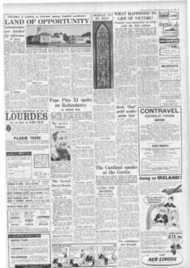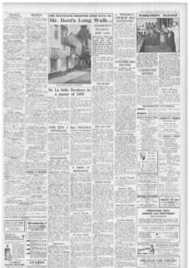Page 1, 11th May 1956
Page 1

Report an error
Noticed an error on this page?If you've noticed an error in this article please click here to report it.
Tags
Share
Related articles
Gormley Pit-falls
God Made Them High Or Lowly Christian Scepticism And...
Nurses' Vote On Strike Action
American Social Pastoral
Play
NIR111110111111+1111iituriliumuniimiummilmiliviloniumiwunimilimpliimliiiilimiliummilinnuminimmilmvistilliimimuipiimisimimpwillomorummumiumpiluipmiumiumilmirminiumvommimiliumillimpluturimouniniumilliiillimmuillilliiimilimionimilluipmlimmuminimomplimminmeimpimainniminiumuitunipiriuridilimumpiviminipmilinviriiiiiimiumoilinsPilmoicimilmoulumuniimilog . 1 ... --.. i 7Z 3 ; THESE IVORDS
STARTED A CHRISTIAN SOCIAL REVOLUTION: *1=A small number of very rich men have been able to lay 1111011 I; the teeming masses of the labouring poor ii yoke little better than that of slavery itself -..''—Pope Leo XIII, Encyclical "Rerorn Novarurn," May 15, 1891.
JUBILEE OF THE 'SQUARE DEAL ENCYCLICAL
A TRADE UNION LEADER SUMS UP BENEFITS OF 2 PAPAL CHARTERS
The silver jubilee of Pope Pius Xl's Quadragesimo Anno" On the Reconstruction of the Social Order "—comes at a time when the workers of this country are getting more of a square deal than they have ever had before— and are forgetting the real reason why they got it and why they are entitled to it.
The danger to-day, when the British working man has reached an unprecedented standard of living, is that he and future generations may reject the moral basis of their rights while taking it for granted that the State will provide.
If that happens the worker is not far from having his rights denied. If the State lets him down, he will have no principle to fall hack on for protection. He will have destroyed it himself.
This is one reason for the supreme importance of the Papal social encyclicals and the danger of relying on secularist humanitarianism, with its promise to solve all our problems. It may work for some of the time—but not all of the time.
Poverty has gone but the worker must still work by the sweat of his brow, and the principles of human dignity must not be allowed to fade in the modern mind.
They are enshrined eternally for every worker's protection in Pope Leo XIll's Realm Novarum On the Condition of the Workers "—and in Quadragesimo Anno,
It is by reference to them that in 1956 man must re-focus the reason why he is entitled to a square deal: their answer being that he is endowed with the dignity of an immortal soul.
These encyclicals have had an enormous effect, direct and indirect. on the social improvement of the working classes in Britain, Europe and the United States.
OPPOSITION
THE roots of the British 2trade union movement lie not in agnostic socialism but in Christianity—the Christianity of the Methodist social reformers and the powerful influence of Catholic leaders and rank and file from the movement's early days.
When trade unionism was young the Bible lay on the table at branch meetings side by side with the minute book. Many of the emblems of the old craft unions amounted almost to holy pictures, emphasising God, the fruits of the earth and the seasons of the year.
It is unpleasant fact that Rerum Novarumespecially, and to a lesser extent Quadragesimo Anna, which applied the same a teachings to more modern con
ditions. were at first resisted by some Catholics.
The first great expression of M Catholic social teaching in an industrial world alarmed a con
eiderable number of our own Es people, and even to some Hier-74 archies it was as unwelcome as
an unwanted child.
At best its reception was luke warm, except among those indi vidual Bishops, priests and lay-ff. men who had been struggling on = their own for years for social -ajustice and who saw Rerum
Novarum as a beacon light shin
..
ing across a Europe already
largely Marxist, But it was the encyclicals which prevented the whole of working class social thought from being sewn up to Marxism.
Bit by hit, Catholic and nonCatholic social leaders began to see in them a way out of the mire left by the Reformation. In the absence of a clear teaching authority, British industry had grown up in the atmosphere of a confused morality.
TREND ARRESTED
TN the Industrial Revolution itself, governments, states. men and individuals had nothing to guide them but greed, which was the uppermost motif until, after industry had driven the world well on the way to
M Communism, the Popes gave us these two great teaching documents, and arrested the trend that was bringing trade unionists into the active Marxist arena.
The British trade union movement is the oldest in the world. L.It was saved from Marxism not
by humanitarian trends so much but largely because the concept of social justice among British social leaders was a Christian one.
Actually, there has been very little constructive secularist social thought in union circles over the past 60 or 80 years, though the Fabians brought it into the political field.
What saved our trade unionism from becoming a political Marxist movement was the evangelical character of its leaders who, Catholic and non-Catholic alike, were considerably stimulated by the Papal teachings.
FR. VINCENT
URNING to the activities
of the Catholics themselves in this country, the great dock strike that could so easily have led to a revolution was settled by Cardinal Manning. There were many Irish Catholics among local and national union officials.
Large pockets of workers in the ports of Glasgow, Liverpool, Merseyside and London were Catholics. And England owes much to a number of individual priests.
To-day, whenever the Papal teachings are referred to, one hears the name of Fr. Vincent McNabb. if ever a priest nailed the flag of the people's cause to the social encyclicals it was he. His influence was as great on our separated brethren as upon ourselves.
He taught the intellectuals and he taught the working class. He showed that the Church was not all " pie in the sky." He tramped lip and down the country making the clergy and laity sit up and see that the Church did have a positive social teaching to answer all social problems.
WE CAN BE PROUD
To-day, although there are not nearly enough of them, we can he very proud of the Catholics prominent in union circles—men like Bob Mellish and Simon Mahon of the Transport and G e n e r al Workers, Stoker Edwards, W. J. Carron of the Amalgamated Engineers. George Woodcock, assistant general secretary to the T.U.C., O'Hagan of the shipbuilders, Tim O'Leary, the dockers' leader at Transport House.
Looking abroad. of course, the finest fruits of the encyclicals blossomed into the Young Christian Workers movement and the work of the pre-war German clergs.
Continued on page 8 Here arc some of the Catholic men mentioned by Sir Tom O'Brien as outstanding leaders in trade union affairs, and others who likewise remember in their own lives and in their work the teaching of the Social Encyclicals.
Here is-
MR. GEORGE WOODCOCK, often seen on television, is assistant general secretary of the Trades Union Congress.
-== MR. GEORGE MEANEY, presi===-dent of the 16,000,000-strong .7–.= organisation formed last year by t-4 the American Federation of E. Labour and the Congress of Industrial Organisations. Another merger has now brought into being a similar organisation in Canada with two Catholics to
lead it. (See page 8.)
MR. ROBERT MELLISH, M.P , a dockers' union official who also =_7, represents the London dockside constituency of Bermondsey.
The kite MR. PHILIP ==-MURRAY, president of the U.S. Congress of Industrial Organisa-Bons, who always had the Social 7. Encyclicals on his desk. He was in his younger days a miner in
Scotland.
blog comments powered by Disqus









